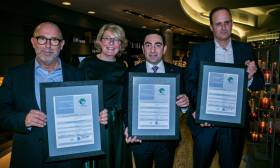Displaying items by tag: Ports Awarded
Congratulations from ESPO As Ports of Barcelona, Vigo and Baku Achieve EcoPorts’ Environmental Standard (PERS)
It was congratulations from the European Sea Ports Organisation as the Port of Barcelona (Spain), Port of Vigo (Spain) and Port of Baku (Azerbaijan) achieved an EcoPorts’ environmental management standard (PERS).
Isabelle Ryckbost, ESPO’s Secretary General, handed over the PERS certificates to the ports’ representatives during the GreenPort Congress in Oslo (see related report).
“I would like to congratulate Port of Barcelona and Port of Vigo for renewing EcoPorts’ environmental standard and Port of Baku for obtaining it for the first time. Ports in Europe are more than ever investing to improve their environmental performance and to get their “licence to operate” from the local community. Transparency and sharing information with stakeholders and local communities are among the main requirements of the EcoPorts environmental standard. Being PERS certified shows that ports measure and share results. PERS ports strengthen the EcoPorts Network and help us monitoring the environmental performance of the whole sector at EU level,” says ESPO’s Secretary General, Isabelle Ryckbost.
“It is important that the number of European ports certified with an international environmental standard (EMS) has significantly increased the last five years. EcoPorts’ PERS which is the only port-specific standard available, has become well recognised and one of the most preferred by the sector. Port’s environmental performance certified by environmental standards such as PERS, is ‘factored –in’ to calculations of premiums by insurance companies and is an evidence of port’s efforts to contribute to the greening of the supply chain,” says EcoPorts coordinator, Sotiris Raptis.
Compliance with the EcoPorts’ PERS standard is independently assessed by Lloyd’s Register and the certificate has a validity of two years. EcoPorts’ PERS is revised after the 2-year period to make sure that the port continues to meet the requirements.
You can find more information on EcoPorts’ PERS here.
























































